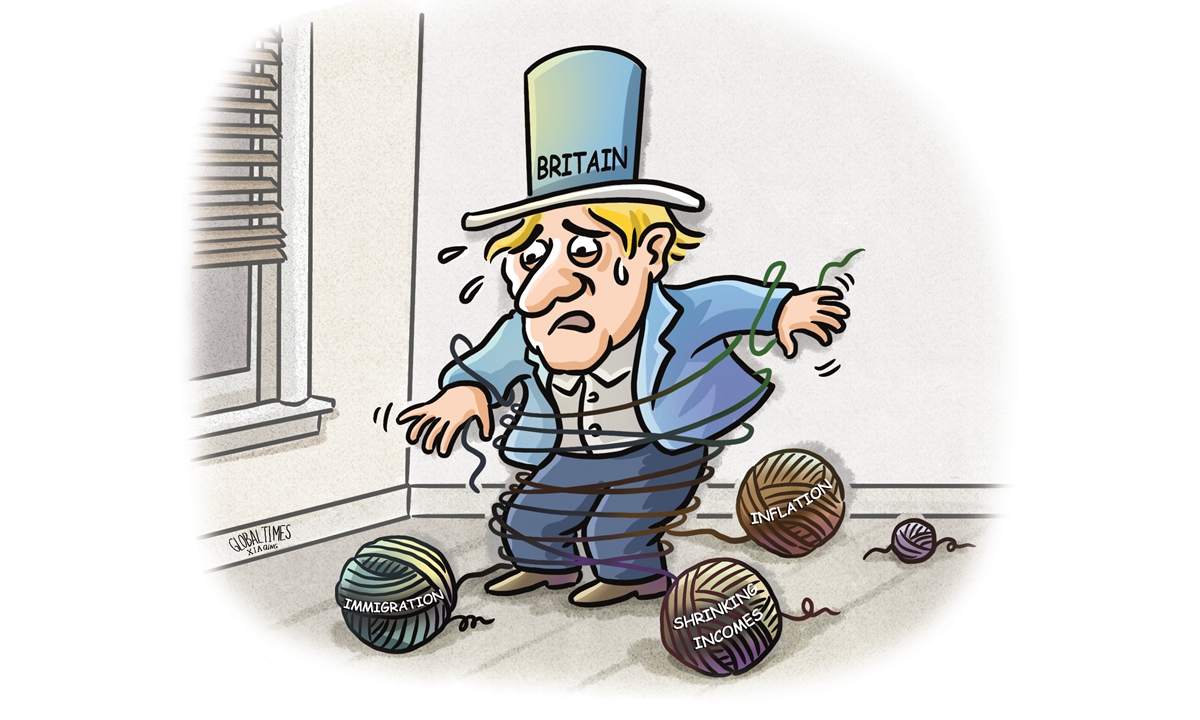
Illustration: Xia/Global Times
This week marks one year since Rishi Sunak took over as the prime minister of the United Kingdom. Sunak, who initially came second in the Conservative leadership race, took over by default after Liz Truss resigned within a month and a half after her mini-budget produced an economic crisis. Truss herself had replaced Boris Johnson who resigned in disgrace following the controversy over lockdown parties. It goes without saying that the government Sunak inherited has very little credibility, and its unpopularity in national polls, as evidenced by two catastrophic by-election defeats, is undeniable. One year later, there is little inclination that Sunak is going to reverse the declining fortunes of the country.
The current UK government is marred by instability, short-termism, and internal conflict in its domestic and foreign policymaking because the Conservative Party is locked in an ideological and factional struggle. This struggle relates to a sentiment of imperialist nostalgia and nationalist populism among many of its MPs which clashes with the need for pragmatic and reality-based governance. While the Conservative Party has always faced this problem in the modern era, which has beset all of its prime ministers, including Margaret Thatcher and John Major, any understanding of current events starts with the fact that Brexit ultimately represented a victory for these factions and strengthened their influence against the liberal-centrist wing which dominates the party, driving it rightward and creating instability.
Sunak, of course, is very much what one would describe as a liberal Conservative, this is because he is business-orientated from a cosmopolitan British Indian background, but that is not the reality of his government. Instead, facing this right-wing pressure, Sunak has pursued governance strictly on right-wing populist terms, increasingly resorting to making inflammatory talking points and appealing to people's prejudices. This has seen his government effectively import US-style "culture wars" tactics which involve targeting immigrants and LGBT issues purely to rile anger, yet failing to actually create any substantial policies for office. It is a government of short-termism.
This instability also reflects negatively on Britain's foreign policy, whereby ideology, populism and demands of the US have made it impossible for Britain to pursue a path for itself to further its national interests. Brexit, of course, was only the first step of this self-destructive route, showing how identity politics premised on imperial era nostalgia, and not economic reality or the country's needs, have taken the front seat. Britain has injured its ties with Europe, but proclaims itself as a "global power" once again without any coherent vision to be a global power. Similarly, Britain has been prevented from seeking China as an alternative due to a combination of American pressure and right-wing criticism from within Sunak's party, with the Eurosceptics having switched their focus from Brussels to Beijing.
As a result of this, Sunak has exerted extraordinarily weak leadership on foreign policy matters and shown very little initiative. He very readily yields to anti-China sentiment and responds to unfavorable developments with inflammatory rhetoric which makes it more difficult to engage with Beijing. While these are not always followed up with action, it shows his unwillingness to take a stand on any issue. For example, he continues to claim China is a threat to the UK's "economic security" among other things. In doing so, he has relinquished his own efforts to personally lead the UK in favor of British national interest. In the case of Britain relentlessly backing Ukraine, these foreign policy mistakes have all added up to Britain's poor economic performance which has seen it beset by a high level of inflation, shrinking incomes, large scale-industrial unrest and surging power prices.
Sunak does not seem to have a strategy or means to fix the British economy, which is set to be one of the worst performing in G7 this year. Rather, his government has resorted to unfounded optimism. This has resulted in a significant decline in popularity among the British public and trailing behind in the polls. The right-wing faction of the Conservative party may have been politically successful enough to force Britain's withdrawal from the European Union, but at the end of the day governance by slogan has its political limits, and the British public at large is increasingly tired of a government that prioritizes rhetoric and scandal over substance.
One year later, Sunak's government appears weak, lacking inspiration and direction. It should be obvious that doubling down on anger at refugees, among other things, is not a substitute for effectively running a country let alone an economy. Sunak does not seem to possess the political will, initiative, or imagination needed to regain his appeal.
The author is a political and historical relations analyst. opinion@globaltimes.com.cn

